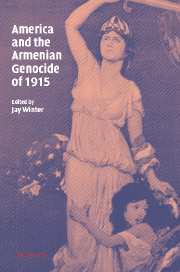Book contents
- Frontmatter
- Contents
- List of contributors
- Map
- Acknowledgments
- Introduction: witness to genocide
- Part 1 The framework
- Part II During the Catastrophe
- 4 A friend in power? Woodrow Wilson and Armenia
- 5 Wilsonian diplomacy and Armenia: the limits of power and ideology
- 6 American diplomatic correspondence in the age of mass murder: the Armenian Genocide in the US archives
- 7 The Armenian Genocide and American missionary relief efforts
- 8 Mary Louise Graffam: witness to genocide
- 9 From Ezra Pound to Theodore Roosevelt: American intellectual and cultural responses to the Armenian Genocide
- Part III After the Catastrophe
- Index
- Studies in the Social and Cultural History of Modern Warfare
5 - Wilsonian diplomacy and Armenia: the limits of power and ideology
Published online by Cambridge University Press: 04 September 2009
- Frontmatter
- Contents
- List of contributors
- Map
- Acknowledgments
- Introduction: witness to genocide
- Part 1 The framework
- Part II During the Catastrophe
- 4 A friend in power? Woodrow Wilson and Armenia
- 5 Wilsonian diplomacy and Armenia: the limits of power and ideology
- 6 American diplomatic correspondence in the age of mass murder: the Armenian Genocide in the US archives
- 7 The Armenian Genocide and American missionary relief efforts
- 8 Mary Louise Graffam: witness to genocide
- 9 From Ezra Pound to Theodore Roosevelt: American intellectual and cultural responses to the Armenian Genocide
- Part III After the Catastrophe
- Index
- Studies in the Social and Cultural History of Modern Warfare
Summary
Armenia emerged as a new nation during the First World War, joining the world order that was taking shape in the wake of collapsing empires. President Woodrow Wilson, in his wartime addresses, proclaimed the principles that should guide the peacemaking for this new world. His decision to attend the 1919 Paris Peace Conference increased the expectations that all peoples, including the Armenians, would have a better future. Wilsonian ideology promised peace and justice for all nations, both old and new. American power, greater than that of any other empire, would presumably enable the United States to help others fulfill Wilson's ideals in the post-war world. Contrary to these hopes, however, Armenia failed as a new nation, revealing not only its own limits but also those of Wilsonianism. The realities of international politics prevented the Armenian people, who had suffered so much in the past, from achieving the Wilsonian promise after the Great War. The limits of American power and ideology resulted in an outcome very different from what the Armenians wanted and what the US President had heralded.
Armenia possessed assets that made it attractive to American leaders. Its people were white – literally Caucasian – and Christian, at least culturally, as a result of the Armenian Orthodox Church's role since the fourth century CE in shaping and preserving national traditions. It also enjoyed bipartisan support from the American political elite. Not only the Democratic President but also the Republican leader, Senator Henry Cabot Lodge, favored the new nation.
- Type
- Chapter
- Information
- America and the Armenian Genocide of 1915 , pp. 113 - 145Publisher: Cambridge University PressPrint publication year: 2004
- 4
- Cited by



